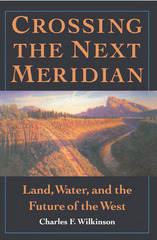
In Crossing the Next Meridian, Charles F. Wilkinson, an expert on federal public lands, Native American issues, and the West's arcane water laws explains some of the core problems facing the American West now and in the years to come. He examines the outmoded ideas that pervade land use and resource allocation and argues that significant reform of Western law is needed to combat desertification and environmental decline, and to heal splintered communities.
Interweaving legal history with examples of present-day consequences of the laws, both intended and unintended, Wilkinson traces the origins and development of the laws and regulations that govern mining, ranching, forestry, and water use. He relates stories of Westerners who face these issues on a day-to-day basis, and discusses what can and should be done to bring government policies in line with the reality of twentieth-century American life.
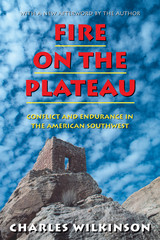
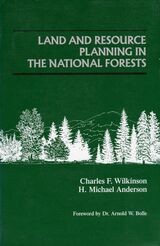
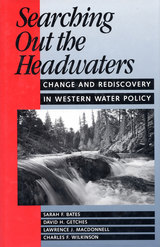
To the uninitiated, water policy seems a complicated, hypertechnical, and incomprehensible subject: a tangle of engineering jargon and legalese surrounding a complex, delicate, and interrelated structure. Decisions concerning the public's waters involve scant public participation, and in such a context, reform seems risky at best.
Searching Out the Headwaters addresses that precarious situation by providing a thorough and straightforward analysis of western water use and the outmoded rules that govern it. The authors begin by tracing the history and evolution of the uses of western water. They describe the demographic and economic changes now occurring in the region, and identify the many communities of interest involved in all water-use issues. After an examination of the central precepts of current water policy, along with their original rationale and subsequent evolution, they consider the reform movement that has recently begun to emerge. In the end, the authors articulate the foundations for a water policy that can meet the needs of the new West and discuss the various means for effectively implementing such a policy, including market economics, regulation, the broad-based use of scientific knowledge, and open and full public participation.
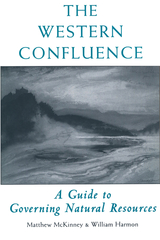
For 150 years, the American West has been shaped by persistent conflicts over natural resources. This has given rise to a succession of strategies for resolving disputes-prior appropriation, scientific management, public participation, citizen ballot initiatives, public interest litigation, devolution, and interest-based negotiation. All of these strategies are still in play, yet the West remains mired in gridlock. In fact, these strategies are themselves a source of conflict.
The Western Confluence is designed to help us navigate through the gridlock by reframing natural resource disputes and the strategies for resolving them. In it, authors Matthew McKinney and William Harmon trace the principles of natural resource governance across the history of western settlement and reveal how they have met at the beginning of the twenty-first century to create a turbid, often contentious confluence of laws, regulations, and policies. They also offer practical suggestions for resolving current and future disputes. Ultimately, Matthew McKinney and William Harmon argue, fully integrating the values of interest-based negotiation into the briar patch of existing public decision making strategies is the best way to foster livable communities, vibrant economies, and healthy landscapes in the West.
Relying on the authors' first-hand experience and compelling case studies, The Western Confluence offers useful information and insight for anyone involved with public decision making, as well as for professionals, faculty, and students in natural resource management and environmental studies, conflict management, environmental management, and environmental policy.
READERS
Browse our collection.
PUBLISHERS
See BiblioVault's publisher services.
STUDENT SERVICES
Files for college accessibility offices.
UChicago Accessibility Resources
home | accessibility | search | about | contact us
BiblioVault ® 2001 - 2024
The University of Chicago Press









